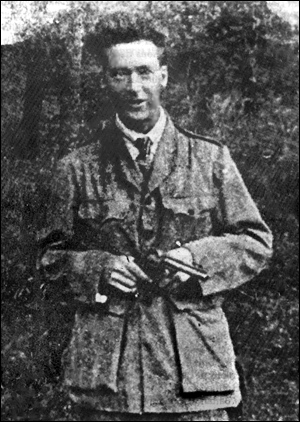Destruction of Rosscarbery RIC Barracks
The ruins of Rosscarbery RIC barracks. The building was was believed to be impregnable before it was attacked by the IRA.
On the last day of March, 1921, the Third West Cork Brigade flying column, led by Tom Barry, attacked and destroyed Rosscarbery RIC Barracks.
Having silently entered the village shortly after 1.00 a.m. they took up a position near the post office, about thirty yards from the barracks, which was surrounded by barbed wire. The upper windows of the buildings opposite the barracks were then occupied and the rear of the building was also covered. A small party of I.R.A. men then removed their boots and carried a 400 lb. bomb, which had been constructed by an ex-British Royal Engineer, to the front door of the barracks.When the device exploded most of the blast went outwards and failed to breach the doorway as had been expected. As the dust settled the garrison opened fire and a fierce battle ensued between the police and their attackers, with both sides using rifles and Mills bombs.
After two hours the police had been driven out of the front ground floor rooms into those at the back but eventually were forced to the top storey of the barracks where they continued their defence. When the IRA exploded two smaller bombs in the ground floor rooms the ceilings collapsed. The floors then caught fire and within minutes the entire building was an inferno. Forced into a single back room, the police garrison then surrendered.
Sergeant Ambrose Shea and Constables Bowles were killed in the attack and it is believed that and Constable Kinsella died of his wounds some time later. Eight other constables were wounded. The police lowered their more seriously wounded members through a back window and left the barracks by the same route. The bodies of Sergeant Shea and Constables Bowles could not be reached as they lay in the ground floor of the burning barracks where they had been killed early in the attack. The surviving RIC men were not fired on as they took shelter in, amongst other places, the local Convent of Mercy.
The I.R.A. suffered no casualties during the attack and dawn was breaking as the retreated from the town. From then until the truce over two months later Rosscarbery was free of British forces.

An exhausted General Tom Barry pictured not long after the attack on Rosscarbery barracks





